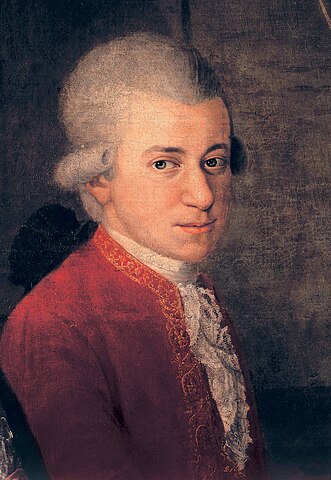
Why did Mozart die so young? No one knows what killed him. However, it was most likely not poison.
Mozart died at the age of 35 on the 5th of December 1791. He was at home in Vienna, Austria. Despite his prodigious career and being the most famous composer of his day, he died without any money and was buried in an unmarked grave. This sounds surprising to us, but at the time, unless you were nobility, an unmarked grave was common. Mozart earned a lot of money during his lifetime, but he spent way more than he earned. He liked to live a fine life and always lived just outside of his means. When he died, he had a lot of debt. His wife didn’t suffer, though, because she was far more adept at business than Mozart was and managed to find several income sources using her husband’s works. Not many people attended Mozart’s funeral, even his wife stayed away, and nobody knew where his grave was. In the middle of the 19th century, a group of historians attempted to find where the grave is and their research did turn up a plot that they said was Mozart’s, but it is more of an educated guess than a fact. He was not buried in a pauper’s grave, simply a grave without a headstone.
So, how did he die? The traditional theory was that he started to get sick in early 1791 and his health continued to deteriorate throughout the year. Mozart said that he believed he had been poisoned. He was working on a commissioned requiem, but he began to believe that it was his own requiem because he knew that he was dying. He became increasingly ill and died, just after he had finished the requiem. This was the story spread at the time, but it was not entirely true. It was spread by his early biographers, and by his wife, Constantine. She had financial reasons for spreading this version of events. Mozart actually died before he had finished his requiem, and Constantine commission two other composers called Joseph von Eybler and Franz Xaver Sussmayr to finish it. She knew that she wouldn’t be able to get the commission money for the requiem or make any money when it was performed if people knew that Mozart hadn’t written it, so she spread that story of his death. She got around the differences of handwriting by saying that Mozart was so ill he had to dictate the last parts of the requiem to his student, Sussmayr.
Since his death, especially in the modern age, a lot of people have tried to work out what he actually died of. The problem is that there isn’t a huge amount of written evidence. There are several eye-witness accounts, but these can’t always be believed because the people who made them had ulterior motives. It appears that he wasn’t sick as early as people say and if he was, he recovered, so that earlier illness may have been unrelated to the one that killed him. It was most likely not poison because that doesn’t present the symptoms that he had. His body became very swollen in the days leading up to his death. He had a high fever and vomited a lot. There are many illnesses that can cause something like this, and without being able to examine Mozart or see an autopsy, it is very difficult to narrow it down. However, a group of researchers from the UCL department of Epidemiology and Public Health took a different approach. They looked at all of the people that died in Vienna in the years before and after Mozart died. It turns out there was a bacterial infection going around at the time called streptococcal, more commonly known as strep throat. Strep throat itself is not usually fatal and goes away in about a week as your body kills the bacteria, even without antibiotics. However, if someone is not in good physical health, or if there are secondary infections, it can lead to kidney failure and death. At the time, blood letting to release disease was common, and Mozart underwent several rounds of blood letting. This could have let in more bacteria and caused even more complications. This would have explained the swollen body, vomiting, and all of his other symptoms. This is not definitive, and we will probably never know what killed Mozart, but strep throat does seem a very likely explanation. If it was strep throat, then it is sad to think that if Mozart had been slightly healthier, or his doctor hadn’t let his blood, he might have lived for many more years and left us a lot more music. And this is what I learned today.
Image By Johann Nepomuk della Croce – http://stafford-choral.org.uk/newsandevents/mozarts-portrait-from-mozart-family-portrait-painted-by-johann-nepomuk-della-croce-salzburg-1790-1791/, Public Domain, https://commons.wikimedia.org/w/index.php?curid=133635036
Sources
https://www.thoughtco.com/where-was-mozart-buried-1221267
https://en.wikipedia.org/wiki/Constanze_Mozart
https://en.wikipedia.org/wiki/Requiem_(Mozart)
https://en.wikipedia.org/wiki/Death_of_Wolfgang_Amadeus_Mozart
https://www.pbs.org/newshour/health/symphony-second-opinions-mozarts-final-illness
https://www.ucl.ac.uk/news/2009/aug/unravelling-mystery-mozarts-death
